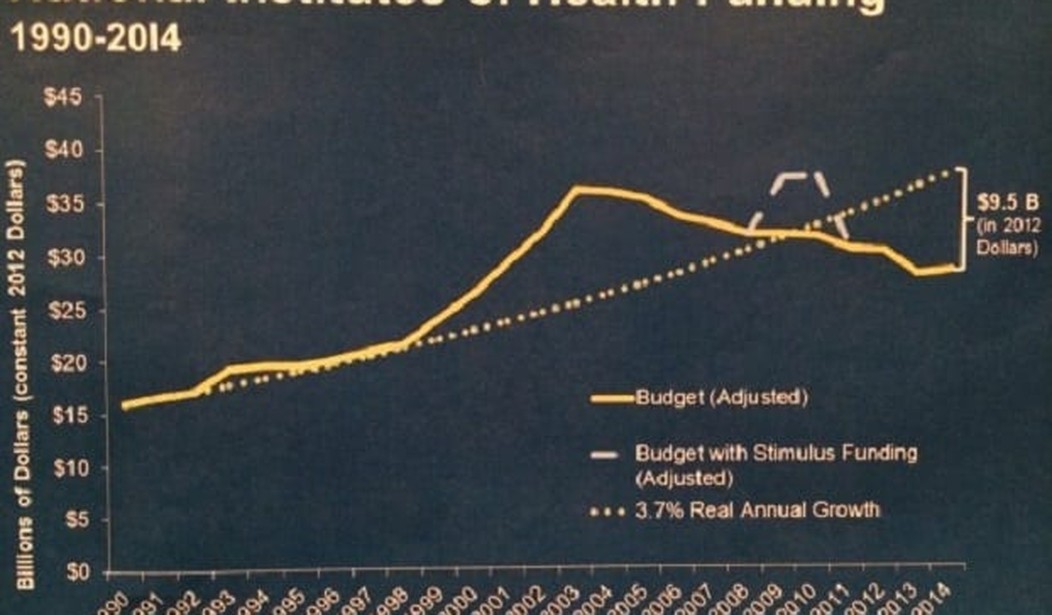 As the administration continues to flop about like a landed fish in its response to Ebola, the agencies that mismanaged the US response are looking at the panic caused by their ineptitude as a fund raising gimmick (here | here).
As the administration continues to flop about like a landed fish in its response to Ebola, the agencies that mismanaged the US response are looking at the panic caused by their ineptitude as a fund raising gimmick (here | here).
The core of the problem is not that NIH or CDC has too little money but rather they have too much. The Washington Free Beacon hits in an article headlined Ebola v. Obesity: The Politicized NIH hits on the problem:
For over a year, the Washington Free Beacon’s Elizabeth Harrington has been documenting research grants provided by the National Institutes of Health to recipients like an obvious conman who said he wanted to bring origami condoms to the world ($2.5 million) and teams studying if obese people could be persuaded to lose weight by having the government text message them ($2.7 million). Last week, with the NIH’s budget in the spotlight—courtesy of the director of the NIH himself, Dr. Francis Collins, who claimed that an Ebola vaccine would likely exist today were it not for a “10-year-slide in research support” for his organization—Harrington wrote a round-up of her work on this issue, observing that the total amount of absurd NIH funding she had chronicled amounted to nearly $40 million, all of which would obviously have been better spent on an Ebola vaccine—or on cancer, or on HIV/AIDS, or on any number of worthy medical causes.
But the problem is not really politicized research in terms that a lay person would describe it. There has been, under Dr. Collins, more amenability to using favorite diseases as a way of building Congressional consensus for increased NIH funding. This results it a distortion of research funding (breast cancer and AIDS are two diseases that have built research empires at the expense of other, equally deadly, conditions, on the strength of public relations campaigns) that perhaps benefits other research areas. And one can’t assume that the money appropriated based on public relations and lobbying would be there if the publicity wasn’t.
Contrary to Dr. Collins’s ill-advised comment (which has sense been disavowed by others) about funding cuts curtailing Ebola research, the real problem is two-fold. First, the development costs for vaccines are astronomical thanks to the regulatory infrastructure and the market is so small that no pharmaceutical company would consider developing it. But behind that is the fact that very few scientists are going to take on Ebola research as a career path because field is so narrow. And without years of work on the disease you will never accumulate the research data that will allow you to compete for a grant. While the competitive grant process might be acceptable for many areas, niche diseases and conditions are not going to win significant research grants.
The real problem is that scientific research has taken on the nature of a sinecure for a handful of successful researchers. A very small number of scientists clustered at a handful of prominent universities both decide what research will be funded and who will receive the funding and they do so largely independent of government oversight. This, to be clear, is not a problem unique to biomedical research but it is more visible there because of insane amount of money appropriated for the purpose. (For other examples, like synchronized swimming for sea monkeys see The Federalist’s coverage of [mc_name name=’Sen. Tom Coburn (R-OK)’ chamber=’senate’ mcid=’C000560′ ]’s Wastebook 2014).
When Congress comes back together it is going to be hit with a lot of pressure to throw more money at the NIH and CDC. Any funding increase needs to be tied to increased Congressional oversight to ensure that research money isn’t spent on giving bunnies massages and that public health priorities, as articulated by Congress, are considered.













Join the conversation as a VIP Member